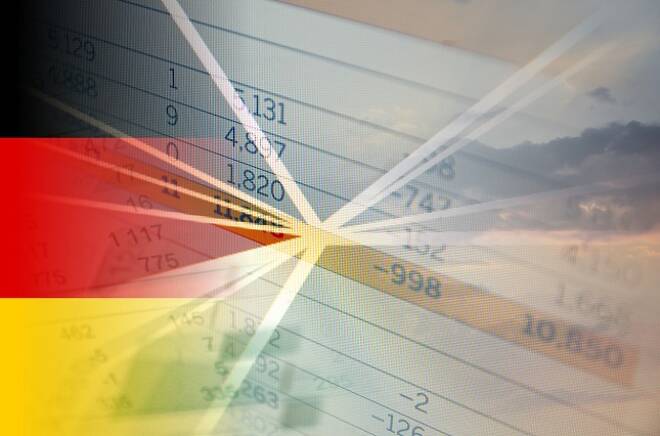Advertisement
Advertisement
DAX Index: US Inflation, the Fed and the Middle East Conflict in Focus
By:
Amidst IMF forecasts and Middle East tensions, the DAX stocks showcase resilience, reflecting Fed influences ahead of US inflation numbers.
Highlights
- DAX rallied 1.95% on Tuesday, shaking off Monday’s 0.67% loss, marking a standout close at 15,424.
- FOMC’s Bostic and Kashkari soothed fears over aggressive rate hikes, offering a market reprieve.
- US producer prices are in focus ahead of US consumer prices on Thursday.
DAX Tuesday Overview
On Tuesday, the DAX rallied by 1.95%. Reversing a 0.67% loss from Monday, the DAX ended the day at 15,424.
The Perfect Storm
News of China intending to increase its budget deficit to boost economic activity fueled demand for DAX-listed stocks. Dovish Fed commentary speeches resonated during the European session, contributing to the positive sentiment.
Investors brushed aside the IFM Global Economic Outlook Report despite the IMF downwardly revising euro area growth forecasts. Hopes of an end to the synchronized monetary policy tightening by central banks acted as a tailwind.
On Tuesday, FOMC members voiced further support for pausing interest rate hikes. FOMC members Raphael Bostic and Neel Kashkari soothed investor jitters over a more aggressive Fed rate path.
The US equity markets responded to an IMF upward revision to US growth forecasts and the dovish Fed comments. On Tuesday, the S&P 500 and the Dow rose by 0.52% and 0.40%, respectively. The Nasdaq Composite Index gained 0.58%.
The Tuesday Market Movers
Auto stocks found much-needed support on China stimulus hopes. BMW rallied 3.03%, with Continental and Volkswagen ending the day with gains of 2.34% and 2.27%. Porsche and Mercedes Benz Group rose by 1.83% and 1.81%, respectively.
However, Daimler Truck Holding bucked the trend, falling by 0.73%.
Adidas resumed the Monday rally, rising by 2.26% on expectations of an upward revision to profit forecasts.
Middle East Conflict, the IMF, and US Producer Prices
Commentary from the IMF/World Bank Meetings and news updates from the Middle East need monitoring throughout the Wednesday session. However, US producer price figures could spook investors before consumer inflation figures on Thursday. A larger-than-expected rise in producer prices may refuel Fed rate hike bets.
With inflation in the spotlight, FOMC member commentary also warrants consideration. FOMC members Raphael Bostic and Christopher Waller are on the economic calendar to speak before the Fed minutes. The Fed meeting minutes are out after the European closing bell.
Voting member Christopher Waller will likely have more impact on the markets. Comments relating to the US economy, the Middle East Conflict, and interest rates would influence market sentiment.
The DAX was down 24 points, while the NASDAQ mini was up 27 points this morning.
Short-Term Forecast
China stimulus news, an end to monetary policy tightening cycles, and easing risks of a long-lasting Middle East conflict will likely support further gains. However, US inflation figures and escalation in the Middle East conflict could adversely affect market risk sentiment.
DAX Technical Indicators
Daily Chart
The DAX remained below the 50-day and the 200-day EMAs, sending bearish price signals.
A break above the 200-day EMA and the 15,459 resistance level would support a move toward the 50-day EMA and the 15,619 resistance level. However, selling pressure will likely intensify at the 15,459 resistance level. The 200-day EMA is confluent with the resistance level.
Near-term trends will likely hinge on Fed and ECB forward guidance, news updates from the Middle East, and US inflation figures.
Failure to break above the 200-day EMA would leave the 15,245 support level in play.
The 14-day RSI reading of 49.06 indicates that the DAX could fall through the 15,058 support level before reaching the oversold territory.
4-Hourly Chart
The DAX hovers above the 50-day EMA while remaining below the 200-day EMA, sending bullish near-term but bearish longer-term price signals. A DAX break above the 15,459 resistance level would support a move to the 15,619 resistance level and 200-day EMA.
However, a drop below the 50-day EMA would support a break below the 15,245 support level to bring the 15,058 support level into view.
The 60.60 14-4 hour RSI reading supports a DAX break above the 15,459 resistance level before entering the overbought territory.
For a look at the economic events, check out our economic calendar.
About the Author
Bob Masonauthor
With over 28 years of experience in the financial industry, Bob has worked with various global rating agencies and multinational banks. Currently he is covering currencies, commodities, alternative asset classes and global equities, focusing mostly on European and Asian markets.
Advertisement
